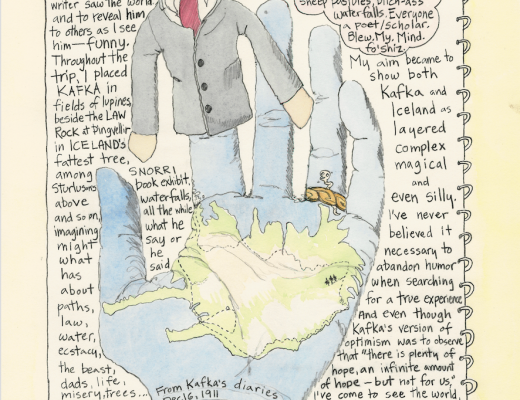The Professor’s Body
Can fragility feel as hot as bravado? I think so, but sometimes struggle to find the way.
—Maggie Nelson, The Argonauts
The professor’s body sits cross-legged on the edge of the desk. Its head turns all round the semicircle to make sure of eye contact with every student.
The professor’s body feels the need to get down from the hard desk. It uncrosses its legs, steps downward. The prof who is, after all, still in her early fifties, lets out an involuntary groan and limps stiffly, like the hunchback of Notre Dame, to the chair behind the desk.
The professor makes a note to self: “Stretches before breakfast.”
The professor’s body, before going to work, gazes longingly at the bed she has just made. Rather than in front of a classroom, playing at authority in constricting clothes, the body would like to be in her white flannel nightie on the bed, reading a book and eating chocolate, or naked under the covers, sleeping peacefully.
Instead, she gets herself into the car with the husband’s body—also, reluctantly, on its way to class—and gets out again on campus half-covered in the dog hair that infests the car. Now there is the removal of the dog hair to be performed, also the checking for an open fly or button or food between the teeth. The mirrors on campus remind the professor’s face that it is more than thirty years older than the students’.
The p. b. had a night of anxiety and bad dreams, perhaps because of the news, perhaps because she saw pictures of a tortured dog. She dragged it—her body—into the tub and then the closet. In the closet there were no clothes appropriate to the sudden, obscene, spring weather. The professor’s body wore sweatpants and an old, stained woolen shirt to class. The temptation was great not to put on a bra, but the professor did not want to cause an undue distraction in the classroom.
The p. b. does a lot of sweating in front of classes, as well, often at the crotch. She wonders if her pants are obviously stained with sweat. When she is especially carried away she will scratch at a scab on some part of her body and begin to bleed. Suddenly, the professor is writing on the board with a bloody hand.
Sometimes the p. b. has imbibed a lot of coffee and suddenly needs to urinate. Then she apologizes to the class, wondering whether to say, “I’m going to the bathroom,” or “I need to pee.” Since the course she is teaching is about the body, she makes a little joke. The making of little jokes is a big part of keeping her body feeling safe and happy and liked.
The professor wonders if she can purge her prose of resentments, or at least, resentments toward institutions and individuals. But is this desirable? Orwell, in “Why I Write,” was frank about the desire for revenge.
For instance, the professor’s body sags a little when she hears that a colleague has told a student something she mentioned confidentially in a department meeting. Such undermining, and to what purpose? The shoulders go down, the neck goes forward, the dowager’s hump that appeared ten years ago becomes more noticeable—at least in the mirror.
Some days the professor has great doubts about her students; some days it’s herself she wonders about, deeply but ineffectually.
Bravado: in this very room where she’s now teaching nonfiction about the body—racialized, gendered, sexualized, tormented, pleasured—sixteen years ago, her ovary exploded.
“Wanna see my scar?” she sometimes imagines herself asking. The professor’s brain is given to fantasies of improper utterance. Sometimes improper utterances do, in fact, burst from her throat like arias. She thinks she’s Callas, but on later evaluation, she was Florence Foster Jenkins.
Why, anyway, does it matter to the professor to be “hot”? Or at least, to feel it? (Are you hot if you feel it but no one else does?)
But the professor has no place to even want to feel hot at the little college in the bleak prairie town. And she figures she’s pretty hot in the classroom, because she catches fire when she’s talking about what matters to her. Hot in that way, at any rate.
When the professor’s body was a student body, it attracted some of her professors. So did her brain. It is hard to go from being a hot student body to a body that delights only the husband-professor’s body. One becomes vain, in youth, from the possession of a hot student body; one expects the attention will last. They were right, the old poets, about looks fading. Her mourning is retrograde.
The professor is easily wounded. A student, a colleague, can inflict a wound with a look or a word of complaint. The professor has always wanted to think that teaching is one thing she is decidedly good at; suggestions to the contrary go to the quick of her being. She worked hard—her body worked hard, her brain worked hard—to become what she is, and the idea that she is still becoming offends her. It feels unfair, even if true. (Within herself, the professor is quite interested in her own evolution. She just doesn’t want comments from fallible others.)
It’s as she weren’t being granted her credentials. That body sat in a hot apartment on the outskirts of the Ivy League town, in a complex of one-story buildings that were once army barracks, and typed away at the massive PC that took up most of her desk, pondering les mots justes for the genius of Virginia Woolf. Certainly not Flaubert, writhing on the carpet for a word, creating a masterpiece; certainly not as hardworking as the better sublimators (by that time in her life, sex was both a need and an irritation) in the Ivy League. But the body, even when it was on the ancient dusty sofa she and her boyfriend had dragged from a curb, the sofa whose springs dug into her back as she lay minutely annotating all the volumes of Woolf’s diaries and letters, did its fair bit of arduous sweating.
When the professor’s ovary exploded in this very classroom, Old Main 311 (where Abraham Lincoln once stood below and debated Douglas), she writhed on the floor. Luckily the lights were off and the students, oblivious, watching a film. The professor picked up her body and took it to the office of a colleague, where it lay on the carpet continuing to writhe and the colleague said, “Don’t worry about farting if you have to.” But farting wasn’t in the offing; vomiting and level-9 pain were.
The ambulance men were funny and sympathetic. Yep, they said, it’s a bad stomach bug going around this winter. Reader, the professor did not know her ovary had exploded. Nor did the ultrasound readers in the small town where people die of misdiagnoses. Thank god for the state of Iowa and its fine university hospital, where the professor’s body was relayed a week later by her husband and her mother.
The mother’s body was round and clad in red like a tomato, so that the first thing the professor saw when she woke up after surgery was that juicy orb. The second thing—Look, said the tomato-mother—was a gray cloth object dangling from a pole. It was the IV pole at the end of her gurney, and the gray thing was a stuffed monkey, guardian rhesus.
The professor is still prone to magical thinking, still able, in times of vulnerability, to endow a monkey-shaped plush object with the life of a real monkey, or at any rate, a real imagined monkey that is full of sympathy and needs the professor’s love. A child? The child she never had? Don’t be sentimental. The prof would have chosen against children even if there had not been health problems on both sides (prof’s body, prof’s husband’s body).
The professor remembers her mother’s professor’s-body at the end of day, lying on the sofa eating apples and swelling. Always tired, swelling, the feet in their “nylons” a little smelly but attractive. The professor as a child sometimes sniffed her mother’s feet because they were so large and tempting.
The mother left the white plastic “egg” shells her nylons came in on the dining room table.
Her father’s p. b. in the classroom wrote rather violently on the chalk board. A revelation, this energy, this possible capacity for methodical violence (he’d been in the army but never shot a soul or even knocked one down). The professor’s body’s own approach is softer, especially now that there are whiteboards. “Your writing is tiny,” says the nearsighted woman in the headscarf. The professor makes an effort. She is always making an effort. She doesn’t want the woman in the headscarf (who wears a delightful perfume) to think her Jewish professor has anything against her.
In the middle of a meeting, the professor’s body must go to the ladies’ room, or rather, the all-gender restroom. When she emerges from the stall, she encounters the tall, stately body of the Director of Advancement. Now the Director will forever associate the smell of feces with the professor’s body, and perhaps even her ability to advance the college will be sullied.
(The famous feminist literary scholar, back in graduate school, always went into the restroom and farted in the break of the Virginia Woolf seminar. The professor has never forgotten it: her initial shock, her later understanding that the middle-aged body is no longer self-contained. The poisons accumulate, and must be emitted, whatever one’s scholarly eminence or achievement.)
The professor feels a secret affinity and attraction toward the Director of A., even as she wants to give her a makeover. The Director has a boyish, pretty face, no wrinkles, bright blue eyes, and the haircut of an adolescent male circa 1955. Her body is ungainly but impressive. Her clothes never fit well, nor do they fit well together. Somehow all this seems emblematic of the complex and demanding role the Director’s body must perform every day. The professor wants the Director’s attention in the way she wanted her professors’ attention back in college. The professor thinks she could make the Director laugh and relax. It is the professor who needs, desperately, to laugh and relax. She needs what the students call a “safe space.”
The professor’s mother’s professor’s-body was always tired, except in moments of delight induced by fruit or excursions. That body, swelling, dwindling, swelling again, spent hours every week in the car, commuting on country roads and highways. Sometimes, as when the road was icy, or the one time when a horse suddenly ran in front of her, it was badly jolted by the sudden necessary swerve.
The professor as a child went to see her mother in the hospital, where she’d had a “DNC.” The prof as a child did not understand the meaning of the letters or the implications of the procedure but was frightened. The professor’s mother’s face smiled at her with reassuring blue eyes from the hospital bed. The prof’s mother came home later that day, driving herself, as the professor’s father did not—and still does not—know how to drive a car. The professor’s mother’s body did all the driving, the shopping, the errands, the cooking, the cleaning, the poring over forms and slips at tax time; the professor’s mother’s body was sorely taxed. Thus, it collapsed at the end of the day, on the sofa, with apples. It became an apple. Or a pear. Or a strawberry. Blueberries.
Many years later, when the professor was a professor (assistant), she visited her mother’s large body in another hospital. The professor’s mother’s colon had been “resectioned.” The professor’s mind was not in a good way and she felt unable to help her mother as she wished she could. These are the guilts that accumulate inside a body. They make poisonous gases; they make muscle pains, and contribute to aches and stiffness.
Now it is her students the professor feels she must and cannot care for, because after all, her own mind and body have demands. They must be kept whole, and sometimes the job of trying to teach the ill-taught makes her mind feel as if it is flying in all directions, a small disaster, tornado collateral.
The professor is teaching Kafka’s “Report to an Academy,” in which an ape-turned-man tells the story of his capture and transfiguration to a group of learned gentlemen. It is, like all Kafka’s works, extraordinary, both humorous and tragic and not at all what’s loosely called “absurd” or “surreal.” It is, in its insights and its references, absolutely real.
What does it mean, though, to “teach” a great work? You can point to lines and images, but you certainly can’t tell the work anything, nor can you really tell students that much about a work; the final assimilation of bitter draughts such as this one rests with them, with their palates and their stomachs and how strong and discriminating these might be. The professor’s body threatens to produce tears when the ability or sensitivity are lacking. The professor sometimes feels like an ape, making sounds and gestures that don’t translate across the gulf.
That gulf, she finds, is increasingly large.
The professor points out, sometimes, the recurring use of the word “bitter” in James Baldwin’s essay, “Notes of a Native Son.” What does it mean, “bitter”? According to a recent book, it’s a taste we like better as we grow older. Still, no one wants to taste bitterness their whole life. The dictionary gives “resentful” and “cynical” as synonyms. Bitter bites, that’s its origin. Imagine being bitten forever and constantly. Dogs biting you. The legendary fear of dogs shared by blacks and Jews. “Man, bite that dog,” said a Nazi camp guard, famously, to his mastiff.
But also, the professor read a story about the men coming back to camp from a day of unspeakable hard labor and being welcomed, every time, by a tail-wagging dog.
Sometimes she brings her dog, Bella, to the classroom. Bella goes from one student to another, then lies down on her side in an empty space of floor and sleeps till the end. Dog’s body; professor’s body. Oh, to lie on the floor and sleep to the end!
But sometimes the professor’s body prances and wags its tail. Often, indeed. The professor’s typing hand could certainly say a good deal more about such moments. Once, she jumped up and down, on heavy bootsoles, trying to get the students to see something: the use of monosyllabic nouns as verbs in a passage of “Time Passes” in To the Lighthouse. The students were amused, or, more likely, bemused, but they got it in the end. She hopes.
Time does, indeed, pass, and the professorial body is less buoyant. Would it still jump up and down for emphasis? Probably not.
The professor’s body is handicapped by a lack of stamina. “Stamina,” a colleague told her when she began her job two decades ago, “is vital here.” The professor would have liked to say that her body had always been a sprinter, never a marathon runner. In high school, the professor’s body was briefly on the track team. It kind-of excelled at the hundred yard dash. The professor’s body has never possessed, nor will it ever possess, stamina. There is no solution to this problem but rest, which is meagerly available.
“No stamina” feels like one of those qualifications that meant ostracism in childhood and youth. Like not having a TV, or being an only child, but worse. Being the last one chosen for a team, and the one whose bad throw loses the game. Since she first heard about the concentration camps, the professor has been sure that neither her body nor her mind would have survived more than a few days (had she been one of the ones sent to work rather than the gas). A book she read recently suggests she might have even lasted a week because women did what they could to cover for one another, but she imagines the women would have been tired very soon of covering for her. What did she have to give in return? A facility with sentences—of no value whatever in the “Here there is no why” underworld. No survival skills, not even the minimal ones you get from having siblings.
The professor is digressing egregiously here. The point is, she has always been ashamed and a little afraid, because of her un-hardy body. She has no muscle tone. She has little breath. She sprints, then collapses. A sad case in an unforgiving world.
Because of her lack of stamina, the professor feels herself daily to be inadequate, perhaps lesser than those around her. She is obsolete, a twinkling star that died a long time ago.
The professor’s body reenters the classroom after the brief hiatus between trimesters. Mentally, she has knitted herself back together but physically, she is still ill—the fourth sinus infection of the winter. It’s spring now, though, and she feels more flexible, more resilient. Is there greater joy than these moments when it feels as though her body, with her mind, takes flight? The students watch, they are not unmoved—
they sense, perhaps, the possibilities of flight.
Natania Rosenfeld is the author of a book of poetry, Wild Domestic, published by Sheep Meadow Press in 2015, and a critical book, Outsiders Together: Virginia and Leonard Woolf (Princeton 2000). Her e-chapbook of essays, She and I, is forthcoming in March, 2018 from Essay Press. Her essays, poems, and fiction have appeared in many journals, including APR, Raritan, Gettysburg Review, Michigan Quarterly Review, and Southwest Review, and four of the former have been listed as “Notable” in recent Best American Essays collections. She is a Professor of English at Knox College and lives in Galesburg and Chicago.
Photo Credit: Valerie Booth



